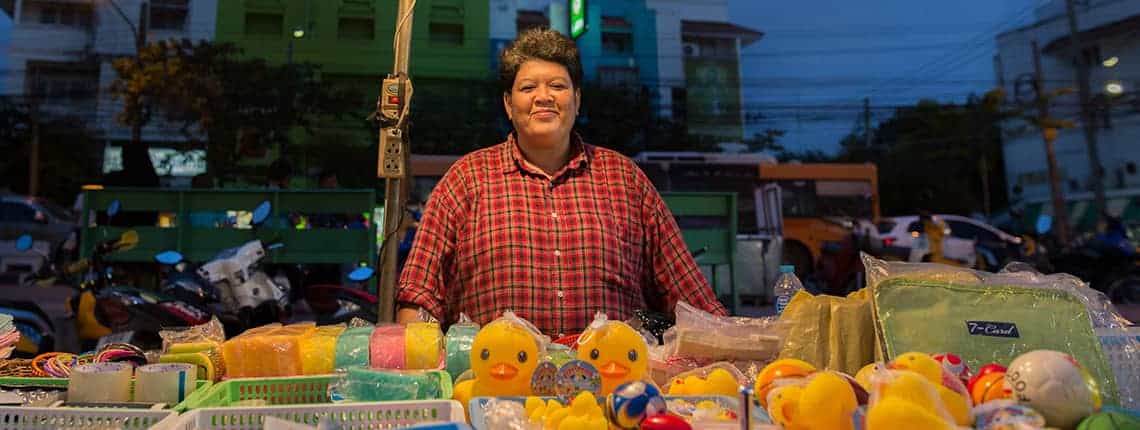Renu is the leader of the Muubaan Nakila Service Cooperative, which is active in her housing estate in Bangkok. Along with other leaders, she supports vendors and their families by helping distribute food relief, facilitating access to medical services, negotiating with local government on safety protocols for the market, and by advocating for a return to trading areas for evicted sellers.
During the three waves of COVID-19 in Bangkok, vendors struggled to make money. Things took a sharp turn for the worse in mid-2021 during the Delta wave, when the government reimposed restrictions and curfews from April 2021 for several months.
“When a vendor took a day off, people would suspect he or she was infected. If there is a rumour that a vendor is infected, customers won’t go to that shop.”
Women vendors struggled especially, as they had to close their shops to homeschool their children when schools closed.
To make ends meet, many vendors had no choice but to reduce their meals or eat less varied meals, borrow money or use their savings. This financial pressure, along with the health crisis, caused mental health issues such as stress, anxiety and depression.
Many vendors received two THB3,500 transfers to purchase essential goods through Thailand’s cash transfer programme in early 2021. While this support was helpful, it did not cover all pressing expenses or capital to recover their livelihoods.
The Muubaan Nakila Service Cooperative provided much-needed additional support to their members, which Renu helped coordinate.
“Luckily the Federation [of Informal Workers of Thailand] gave me a lot of survival bags. Not only did we take care of our members, we had to take care of the community as well.”
There were also many instances of individual solidarity, where vendors would share meals, for example. “We won’t leave our friends to starve to death.”
When impractical protection measures were enforced at the market, Renu’s cooperative helped mediate the issue. “The problem was with the one-way entrance, buyers must take a long detour. We eventually had to open all entrances and set up temperature scanners at every entrance. The authorities permitted us to do so. We bought the scanners ourselves.”
Vaccination was made available to the market vendors on the request of HomeNet Thailand and the Federation of Informal Workers of Thailand. Vaccine hesitancy was a concern for worker leaders, who stepped in to encourage workers to get vaccinated. “On the day the doctor came to vaccinate us, I volunteered to help with registration at the vaccination site.”
Renu says there is an important role for the government in getting vendors back to work: providing access to trading spaces, developing a fairer tax structure for vendors depending on where they work, and addressing barriers to Government Savings Bank loans.
“What the government could be doing right now is to give back trading areas to vendors so they can make a living and they won’t need to worry about anything because they’ll survive. The customers know us. As long as we get to make a living, it’s enough.”
* This story is based on interviews with Renu for round 2 of WIEGO’s COVID-19 Crisis and the Informal Economy Study, in October and December 2021. It was published with Renu’s consent.
